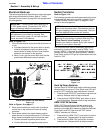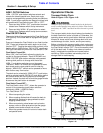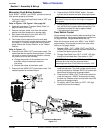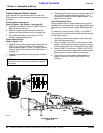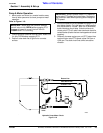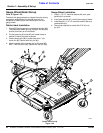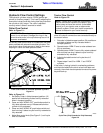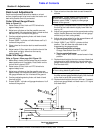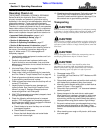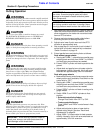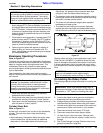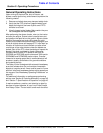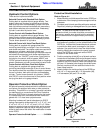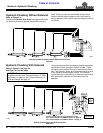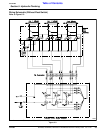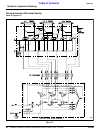
27
Section 3: Operating Procedures
12/16/08
RCP2660, RCPM2660, RCP3060 and RCPM3060 Parallel Arm Rotary Cutter 316-111M
Land Pride
Table of Contents
Section 3: Operating Procedures
Operating Check List
The RCP2660, RCPM2660, RCP3060 & RCPM3060
Series Parallel Arm Hydraulic Rotary Cutters are
uniquely versatile and powerfully productive cutting
implement in the hands of a knowledgeable, skilled and
responsible operator. These cutters are frequently
operated on inclines in populated and high traffic areas.
Therefore, it is absolutely essential that no one operates
these cutters without first having read, fully understood
and become totally familiar with the Operator’s Manual.
Make sure the operator has paid particular attention to:
• Important Safety Information, pages 1 to 9
• Section 1: Assembly & Set-up, page 12
• Section 2: Adjustments, page 25
• Section 3: Operating Procedures, page 27
• Section 6: Maintenance & Lubrication, page 37
Make the following inspections after attaching cutter to
the tractor. See hook-up instructions beginning on
page 14. Make certain PTO is disengaged and
completely stopped.
1. Inspect tractor safety equipment to make sure it is in
good working condition.
2. Carefully raise and lower implement with tractor
3-point controls to ensure drawbar, tires, and other
equipment on the tractor do not contact the frame or
PTO driveline.
3. Lubricate Rotary Cutter as needed. Refer to
“Lubrication Points” on page 40.
4. Check cutter initially and periodically for loose bolts
and Pins. Refer to “Torque Values Chart” on page 48.
5. Check all guards and shields to make certain they are
in good working condition and in place.
6. Check all hoses and wires to be sure that they will not
contact PTO driveline.
7. Inspect Hydraulic hoses for wear, damage and
hydraulic leaks. See “Avoid High Pressure Fluids
Hazard” on page 3. Replace damaged and worn
hoses with genuine Land Pride parts.
8. With PTO disengaged and completely stopped, check
cutting blades for sharpness.
9. Check the following with deck placed in transport
position, PTO disengaged and completely stopped,
and the transport safety chain is engaged in the deck
hook. Wear your safety glasses.
a. Check blades to be sure that they are not locked
(overlapped) together.
b. Check blades for sharpness.
c. Ensure that both blade bolts and center blade
carrier hub nuts are tight.
10. Checktractor safety equipment.Particularly check the
ROPS (Roll Over Protective Structure) and the
Operator Protective shield (optional, see page 31) to
be sure both are in good working condition.
Transporting
!
CAUTION
Always use accessory lights and devices for adequate warning
to operator’s of other vehicles when traveling on public roads,
night or day. Comply with all federal, state and local laws.
!
CAUTION
When traveling on public roads whether at night or during the
day, use accessory light and devices for adequate warning to
operators of other vehicles. Comply with all federal, state and
local laws.
!
CAUTION
Always disengage tractor PTO before transporting cutter to
avoid injury from thrown objects or blade contact.
!
CAUTION
The cutter is 10’-6" wide. Care should be taken when
encountering oncoming traffic and roadside obstructions.
Reduce speed and/or stop if in doubt about safe clearance.
Resume traveling speed only after it is safe to proceed.
1. Disengage tractor PTO.
2. If provided, set Float Switch to “OFF”. Make sure LED
light is “OFF”.
3. Retract both parallel arms and position deck vertically
with blades facing outboard (away from tractor).
4. Manually hook transport safety chain to deck hook as
shown in Figure 1-15 on page 20.
5. Raise hitch up to provide 8" - 12" clearance between
deck and ground.
6. Always transport to the work site at a safe speed.
When traveling on roadways, transport in such a way
that faster moving vehicles may pass you safely. A
slow moving vehicle sign should always be properly
displayed when using public roads or right-of ways.
7. Be sure to reduce tractor ground speed when turning;
and leave enough clearance so the Rotary Cutter
does not contact obstacles such as buildings, trees or
fences.
8. When traveling over rough or hilly terrain, shift tractor
to a lower gear.



